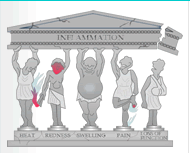Outline of research areas
Introduction for PRESTO research area
Strategic sector
Creation of basic medical technologies for the prevention, diagnosis and treatment of cancer, arteriosclerotic diseases, and autoimmune disorders by the elucidation of the mechanisms underlying chronic inflammation
Research area
"Elucidation and control of the mechanisms underlying chronic inflammation"
Outline
Inflammation, which forms a part of the complex biological response of vascular tissues to pathogens, damaged cells, or irritants, is a protective response of an organism to remove the injurious stimuli and to initiate the healing process. There are two types of inflammation: acute and chronic. Acute inflammation is the initial response of the body to harmful stimuli. Prolonged inflammation, known as chronic inflammation, is characterized by simultaneous destruction and healing of tissue as a part of the inflammatory process. Abnormalities associated with inflammation, particularly chronic inflammation, comprise a large group of disorders that underlie a vast range of human diseases.
Recent progress in immunology and inflammation research has revealed a molecular basis for inflammation and chronic diseases. However, it remains elusive as to how acute inflammation progresses to chronic inflammation spatiotemporally, and how chronic inflammatory diseases develop in various tissues.
This research area aims to create innovative research to clarify the regulatory mechanisms involved in the pathogenesis of inflammation and chronic diseases. The subject covers areas of exploratory research and development of technologies that are expected to benefit the society and to connect basic inflammatory research to clinical research on chronic disorders. The main objective is to clarify and control chronic inflammation and inflammatory disorders by analyzing not only the pathogenesis and maintenance of chronic inflammation with a spatiotemporal perspective but also the severe progression of diseases with a background of chronic inflammation.
From this perspective, this research area includes various research approaches, such as immunology, microbiology and virology, cell biology, pathology, experimental inflammation and tissue engineering, and clinical medicine. Applications regarding the following topics will be appreciated.
1) Molecular and genetic approaches from the standpoint of tissue and organ layers, in addition to those from the standpoint of molecular and cellular layers, and the examination of these approaches from a close perspective.
2) Interaction between cells and tissues, including dynamic approaches in vivo, regarded as a complex systems view of chronic inflammation.
3) Approaches from the perspective of other life sciences, such as epigenetics and functional noncoding RNA.
4) Gene products and physiologically active substances, from the perspective of technical fields, and those that detect and measure cellular dynamics.
5) Medical applications, such as anti-aging drug development for the next generation, for control of chronic inflammation.
Message from Research Supervisor
In the 21st century, our society is aging, and there are concerns about medical needs that support the maintenance of health in such a society. In general medicine, increasing attention is being paid to chronic inflammation because this process is involved in the initiation and pathogenesis of various diseases, such as cancer, lifestyle-related diseases, and Alzheimer disease, which are increasingly prevalent with advancing age. As inflammation is a protective response of an organism to remove both external environmental stimuli (infectious pathogens and adverse environmental factors) and internal environmental factors (age, nutrition, stress, and metabolism), we recognize that inflammation by itself is a favorable response for humans. However, tissue infiltration of inflammatory cells and development of chronic inflammation are often observed in local organs involved in various chronic diseases (cancer, neurodegenerative diseases such as Alzheimer disease, diabetes, atherosclerotic diseases, autoimmune disease, and allergy). It appears that chronic inflammation plays a major role in the etiology of degenerative diseases and aggravation of chronic diseases.
However, it is unclear how chronic inflammation causes severe diseases and contributes to the pathogenesis in degenerative tissues. Because the acute inflammatory response disappears several days after onset, it is not known why mild inflammation is sustained and why it eventually progresses to chronic and persistent inflammation. The highly functional regulatory mechanisms of the immune, nervous, and endocrine systems are complexed, and therefore it would be interesting to clarify the relationship between chronic inflammation and the spatiotemporal regulation of these mechanisms. If we are able to answer these questions, we may be able to develop strategies to prevent various diseases associated with aging, establish novel diagnoses and treatment, and facilitate development of new drugs. We hope to contribute to the development of the basic technology required for preemptive medicine, essential in an aging society.
The following research proposals are the subject of this research area: (1) the mechanism of the development of chronic inflammation due to impaired regulation of acute inflammation, (2) the mechanisms of severe chronic disease and tissue degeneration in chronic inflammation, and (3) the mechanisms of spatiotemporal control of chronic inflammation.
As chronic inflammation is caused by complex mechanisms, cooperative research among various disciplines such as clinical medicine, basic medical research, and cell biology is essential. In this research area, we encourage researchers from various disciplines to apply proposals for investigating chronic inflammation. This would contribute not only to the promotion of research but also enable cooperation and active exchange of information with researchers from various fields. Interestingly, researchers in CREST who study regulation of inflammatory response and disease control have commenced their study at the same time with the same strategic goals as ours. I personally desire that our work in this research area will be in active collaboration with those by the researchers in CREST, which heralded this field of research. Together, I believe that we should aim for elucidating the mechanisms of chronic inflammation. I also hope that all the researchers associated with CREST/PRESTO work together for the progress of this research.



